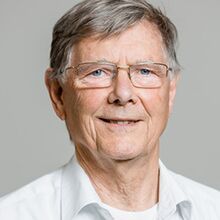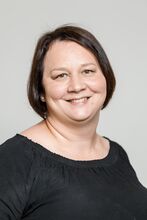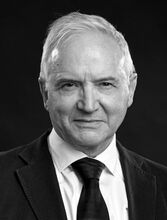Immunisation & Treatment
Webinar: Immunisation & Treatment
| File | Type | Size |
|---|---|---|
| 1. Paula Tähtinen.pdf | Adobe Portable Document Format | 1.6 MB |
| 2. Lin Chen.pdf | Adobe Portable Document Format | 2.6 MB |
| 3. Peter Openshaw.pdf | Adobe Portable Document Format | 4.9 MB |
| 4. Immunisation Take Home Messages.pdf | Adobe Portable Document Format | 2.7 MB |
30 November 2023, 16:00 - 17:30 CET
ESWI organised a webinar diving into immunisation & treatment. It is a follow-up to the podcast series ESWI Airborne: Immunisation & Treatment which was released on 20 November 2023.
Webinar chairs: Ab Osterhaus and Colin Russell.
Guests: Lin Chen, Paula Tähtinen and Peter Openshaw.

Nationality: Dutch
Position: Founding Director of the Center of Infection Medicine and Zoonosis Research and Guest-Professor at the University of Veterinary Medicine Hannover
Research fields: Virus infections of humans and animals
Professor Osterhaus is the Founding Director of the Center of Infection Medicine and Zoonosis Research at the University of Veterinary Medicine Hannover, Germany, and cofounder/CSO of Viroclinics-DDL BV (currently part of CERBA) and ViroNative BV (both spin-outs of Erasmus MC) and CR2O. He was head of the Department of Viroscience at Erasmus MC Rotterdam until 2014.
He has a long track record as a researcher and project leader of numerous major scientific projects. At Erasmus MC, he has run a diagnostic virology lab with more than 40 staff and a research virology lab with over 150 personnel. His research programme follows an integrated “viroscience” concept, bringing together world-leading scientists in molecular virology, immunology, epidemiology, pathogenesis, and intervention studies for human and animal virus infections.
Among his major accomplishments are the discovery of more than 80 viruses of humans and animals (e.g. human metapneumovirus, coronaviruses, influenza viruses), elucidation of the pathogenesis of major human and animal virus infections, and development of novel intervention strategies. This has enabled health authorities like the WHO to effectively combat disease outbreaks like SARS and avian influenza. The established spin-outs are among his other societally relevant successes, allowing effective testing and refining of diagnostic tools and other intervention strategies.
Professor Osterhaus has acted as mentor for more than 85 PhD students and holds several key patents. He is the author of more than 1360 scientific papers in peer-reviewed journals, together cited > 90,000 times with an H index > 145. He holds several senior editorships and has received numerous prestigious awards. He is a member of the Dutch and German National Academies of Sciences, member of the Belgium Academia of Medicine, and Commander of the Order of the Dutch Lion.
- Science, Public Health, and Funding in a changing world
- Intervention Strategies: hMPV - the (not so) new kid on the block
- Flu vaccines - advancements, challenges, and global impact
- Which viruses could cause the next pandemic?
- Which viruses could cause the next pandemic?
- Will there be a new pandemic? When will it be and are we better prepared for it this time around?
- Is COVID-19 worse than influenza?
- Scientific highlights of the 9th ESWI Influenza Conference
- ESWI Summit 2024: Rapporteur from the RSVVW’ 2024 meeting in Mumbai
- Webinar: Immunisation & Treatment
- ESWI Respiratory Virus Summit 2024
- The Ninth ESWI Influenza Conference: Highlights
- The Influenza B/Yamagata lineage appears to become extinct: implications for quadrivalent influenza vaccines?
- RSV looking towards the future
- ESWI pandemic preparedness summit: where science and policy meet
- Respiratory Virus Summit 2023
- Celebrating ESWI 30 years!
- test
- “Flu, COVID and RSV: How to vaccinate?” symposium at Options XI
- ESWI Summit 2022 – Stakeholder Debate
- ESWI Summit 2022 - Conclusions
- World Influenza Conference
- ESWI Summit 2022: Pandemic Preparedness, Where Science and Policy Meet
- Pandemic Preparedness Planning in Peacetime
- World Vaccine Congress Europe 2022
- Flu and COVID-19 booster Vaccinations: where do we go?
- RSV Disease in a COVID-19 era
- COVID-19 Treatment and Medication
- Childhood Influenza Vaccination and treatment in a COVID-19 era
- Vaccination in a COVID-19 era
- Should we introduce national live vaccination programmes for children?
- Influenza in persons living with diabetes: Pathogenesis and prevention

Nationality: American, British
Position: Professor of Applied Evolutionary Biology, University of Amsterdam Faculty of Medicine
Research field: Virus Evolution
ESWI member since 2019
Colin Russell is a professor at the University of Amsterdam School of Medicine. His research focuses on the evolutionary dynamics of human respiratory viruses and the immune responses that control them. He has worked extensively on the within-and-between host evolution of influenza viruses, influenza virus vaccine composition, and issues related to diagnostic and sequencing resource allocation for virus surveillance. Professor Russell regularly advises a wide variety of international organisations, including WHO, on topics ranging from surveillance to pandemic preparedness, vaccine design, and test-to-treat programs. Colin is the Chair of the ESWI since 2023 and the Chair of the EU Steering Group on Influenza Vaccination since 2024.
- Satellite Symposium: A Shot in the Arm: Leveraging Combination Vaccines for Global Health Impact
- Competition between transmission lineages mediated by human mobility shapes seasonal influenza epidemics in the US
- Wrap up - Unpacking intervention strategies for acute respiratory viruses
- Uncovering the Contrasts and Connections in PASC: Viral Load and Cytokine Signatures in Acute COVID-19 versus Post-Acute Sequelae of SARS-CoV-2 (PASC)
- When should you take antiviral drugs?
- What is hybrid immunity?
- Scientific highlights of the 9th ESWI Influenza Conference
- Determinants of epidemic size and the impacts of lulls in seasonal influenza virus circulation
- Webinar: Immunisation & Treatment
- Burden of acute respiratory virus infections
- The Ninth ESWI Influenza Conference: Highlights
- Burden of disease - The economic and societal impact of acute respiratory viruses
- ESWI pandemic preparedness summit: where science and policy meet
- Celebrating ESWI 30 years!
- SARS-CoV-2 diagnostic testing rates determine the sensitivity of genomic surveillance programs
- test
- “Flu, COVID and RSV: How to vaccinate?” symposium at Options XI
- Using mathematical modelling to predict virus evolution and inform pandemic response
- ESWI Summit 2022: Pandemic Preparedness, Where Science and Policy Meet

Lin H Chen currently works at the Travel Medicine Center, Mount Auburn Hospital. Lin does research in Travel Medicine.

Nationality: Finnish
Position: Clinical Lecturer and Adjunct Professor, Paediatrics and Adolescent Medicine, University of Turku
Research Fields: respiratory tract infections, especially acute otitis media
ESWI member since 2022
Dr. Tähtinen received her Doctor of Medicine from the University of Turku in 2004. After graduating, she worked as a GP and resident in paediatrics in Central Finland and then as a PhD student at the University of Turku. In 2012, she successfully defended her PhD thesis entitled “Treatment of acute otitis media”. The same year, she received the ESPID Young Investigator Award and was selected as a Researcher of the Year by the National Graduate School of Clinical Investigation. After obtaining her PhD degree, Dr. Tähtinen continued her specialisation in paediatrics at the Turku University Hospital, Department of Paediatrics and Adolescent Medicine.
In 2013-2015 and in 2017 Dr. Tähtinen moved to the United States to work as a Postdoctoral Research Fellow at the Boston University School of Medicine and Harvard T.H. Chan School of Public Health. During her time in Boston, Dr. Tähtinen also studied at the Harvard Medical School Global Clinical Scholars Research Training Program in which she graduated in 2015.
Currently, Paula Tähtinen is an Adjunct Professor and Clinical Lecturer at the University of Turku, Finland. She is also working as a paediatrician at Turku University Hospital. She is leading her own research group with the main focus on prevention and treatment of respiratory tract infections. Dr. Tähtinen has been actively involved in the development of scientific and professional education at the University of Turku. She has also served as a Young ESPID (European Society for Paediatric Infectious Diseases) country representative and a committee member at the ESPID Research Networking Committee. In 2022, Dr. Tähtinen received the Helena and Niilo Hallman Prize for the best young researcher in the field of paediatrics.
- Burden of disease in acute respiratory virus infections
- ESWI invites coalition partners: Life Course Immunisation: A Seamless Approach to Protection Across All Ages
- What is the difference between influenza and a common cold?
- Immunisation & Treatment - Societal benefits of immunising children
- Webinar: Immunisation & Treatment
- Respiratory tract infections in children - our paediatrician's insight and bold vision for the future

Nationality: British
Position: Respiratory physician and mucosal immunologist, Professor of Experimental Medicine, Imperial College, London
Research fields: Lung immunology, RSV, received a lifetime achievement in work on RSV research (Chanock prize, US, in 2012)
ESWI member since 2008
Peter Openshaw MD PhD CBE is Professor of Experimental Medicine at Imperial College London, UK. A respiratory physician and mucosal immunologist, his research focuses on how the immune response both protects against viral infection but also causes disease.
He has published widely on vaccinology, the immunopathogenesis of pulmonary viral diseases and lung inflammation. He is especially known for his work on respiratory syncytial virus (RSV), influenza and COVID-19, and for the development of human challenge in volunteers. He has co-authored over 400 publications and has an h-index of 105 (Google Scholar accessed Aug 2024). See also: https://orcid.org/0000-0002-7220-2555.
He was the first clinical President of the British Society for Immunology (2013-18) and served on many grant committees and Advisory Boards, becoming an Honorary Lifetime Member of the British Society for Immunology (2019). He has received prizes for his lifetime contribution to RSV research (Chanock Award, 2012), the European Federation of Immunological Societies Award (2014) and the Per Brandtzaeg Distinguished Scientific Achievement Award in mucosal immunology (2024).
He has built strong connections with journalists in print, radio and TV and used social media to promote accurate reporting of science stories, especially in relation to vaccines and respiratory disease. For example, he appeared over 100 times on national and international TV and radio between March 2021 and March 2022, explaining the complexities behind the COVID-19 pandemic response.
He advised the UK government on pandemics (SAGE, 2009-12; Chair/Vice-Chair of NERVTAG, 2015-2022). He was made a Commander of the British Empire for services to Medicine and Immunology in the 2022 UK New Year’s Honours and received the 2024 Imperial College Medal for his work as a Consul, supporting the development of the university’s Ethos, Values and Behaviours (Respect, Collaboration, Excellence, Integrity and Innovation).
- RSV - the bumpy road towards a vaccine
- Is RSV a serious illness?
- How can you tell the difference between RSV and other respiratory diseases, like COVID-19 or influenza?
- ESWI Respiratory Virus Summit 2024 recap video
- Targeted metagenomics reveals association between severity and pathogen co-detection in infants with respiratory syncytial virus
- ESWI Summit 2024: Conclusions
- Welcome By The Co-Chairs at the Respiratory Virus Summit 2024
- Immunisation & Treatment - New approaches to influenza prevention and treatment - lessons learnt from COVID- 19
- Webinar: Immunisation & Treatment
- ESWI Respiratory Virus Summit 2024
- ESWI Symposium: RSV Looking towards the future
- RSV looking towards the future
- Respiratory Virus Summit 2023
- “Flu, COVID and RSV: How to vaccinate?” symposium at Options XI
- A mucosal perspective on pandemics
- Using correlates to accelerate vaccinology
- RSV Disease in a COVID-19 era








